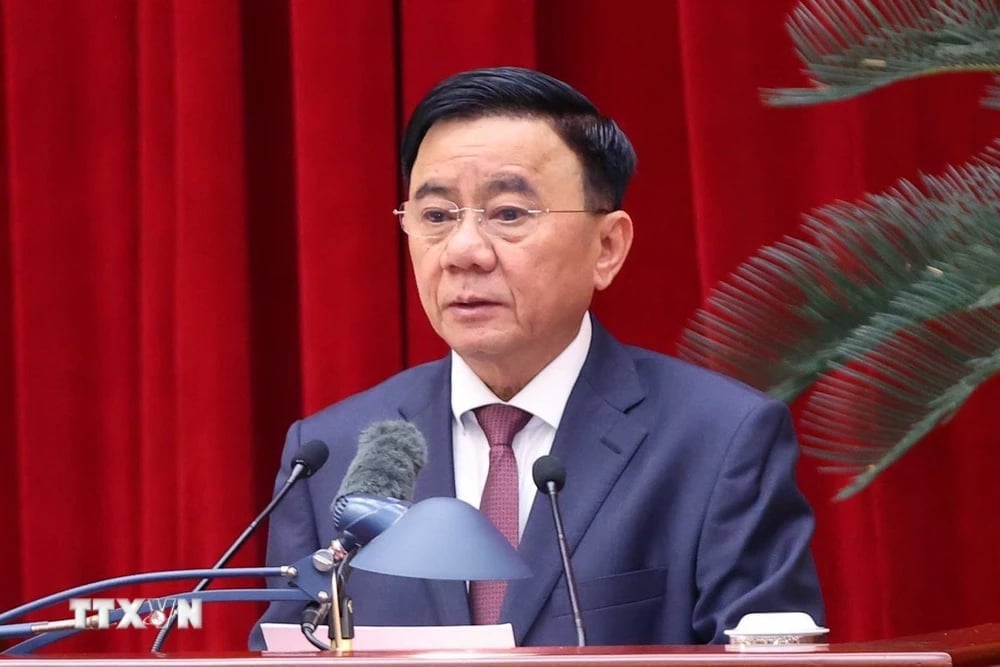November 28, 2025 | 04:58 GMT +7
November 28, 2025 | 04:58 GMT +7
Hotline: 0913.378.918
November 28, 2025 | 04:58 GMT +7
Hotline: 0913.378.918

Standing member of the Secretariat Tran Cam Tu. Photo: VNA.
On April 14, Standing member of the Secretariat Tran Cam Tu, on behalf of the Politburo, signed and issued Conclusion 150 (Conclusion 150) guiding the development of personnel plans for provincial-level Party committees subject to consolidation, merger, and newly established commune-level Party committees.
The personnel plan for provincial Party committees of localities subject to consolidation and merger includes current provincial Party committee members, standing committee members, and inspection committee members.
The conclusion also requires maintaining principles in personnel work, ensuring strictness, democracy, objectivity, transparency, fairness, impartiality, and compliance with Party and State regulations during the administrative reform.
Absolutely avoid local tendencies, sectionalism, group interests, and negativity in assigning, arranging, and recommending cadres.
At the time of reform, the number of vice chairmen of the People's Council, vice chairmen of the People's Committee and deputies of affiliated agencies and units may be more than prescribed.
The assignment of Party Committee members, Standing Committee members, and Party Committee inspection committee members may be greater in some affiliated agencies and units.
After 5 years, the number and arrangement of personnel will be implemented according to regulations.
Regarding key leaders of localities after the administrative reform, the personnel plan for key leaders of the provinces after the merger must be reported to the General Secretary, key leaders, and the Standing Secretariat for comments.
After that, this plan is completed to submit to the Politburo and Secretariat for consideration and decision.
Regarding personnel at the Party Committee, local leaders assigned by the Politburo will convene and prepare the content for developing the personnel plan.
According to the conclusion of the Politburo, the personnel plan includes: Reporting on the situation of the staff of localities subject to consolidation and merger; preliminary assessment of advantages and difficulties; developing a personnel plan and orienting the assignment of personnel to take on leadership positions of affiliated agencies and units for the current term and for the next term.
After this step, the person assigned by the Politburo, together with the provincial and municipal party secretaries in the merger or acquisition area, will organize a conference of the standing committees of the provincial and municipal party committees of the merged or acquired localities to discuss and contribute ideas to complete and approve the personnel plan.
Regarding personnel at the Party Committee, Standing Committee, Inspection Committee at the commune level and the assignment of leadership positions at the commune level, the personnel plan is entirely directed by the Standing Committee of the Provincial Party Committee and City Party Committee based on standards, conditions, structure, and quantity to direct the construction and approval.
The Politburo also noted that before ending the operation of district-level administrative units and establishing new commune-level administrative units, the Standing Committees of provincial and municipal Party Committees need to review the source of district proactively- and commune-level cadres to have plans for consideration, mobilization, assignment, and arrangement.
Translated by Quynh Chi

(VAN) After the institutional merger, Da Nang possesses significant forest-carbon reserves and is proactively engaging in the carbon market, creating a new revenue stream.

(VAN) An Giang strengthens communication against IUU fishing, increases inspections and sanctions, and is determined to remove the EC’s “yellow card” while developing a sustainable fisheries sector.

(VAN) As green transition becomes a global trajectory, Viet Nam’s biggest challenge is not only technology and models, but how to ensure that capital flows reach the right beneficiaries.

(VAN) The Ministry of Agriculture and Environment must spearhead the construction of green governance, spanning decision-making processes and investment standards to policy evaluation mechanisms.

(VAN) The Agriculture and Environment sector of Khanh Hoa has achieved numerous milestones over the past 80 years, contributing significantly to the goal of establishing the province as a centrally governed city by 2030.

(VAN) Viet Nam is entering the pivotal period of 2025-2030, moving toward the formulation of the Remote Sensing Law, which will establish a legal foundation for the development of national digital data.

(VAN) The agricultural sector is finalizing the strategic framework for emission reduction, setting the goal of sharply cutting methane and 403.7 million tons of CO2 equivalent and moving toward Net Zero by 2050.